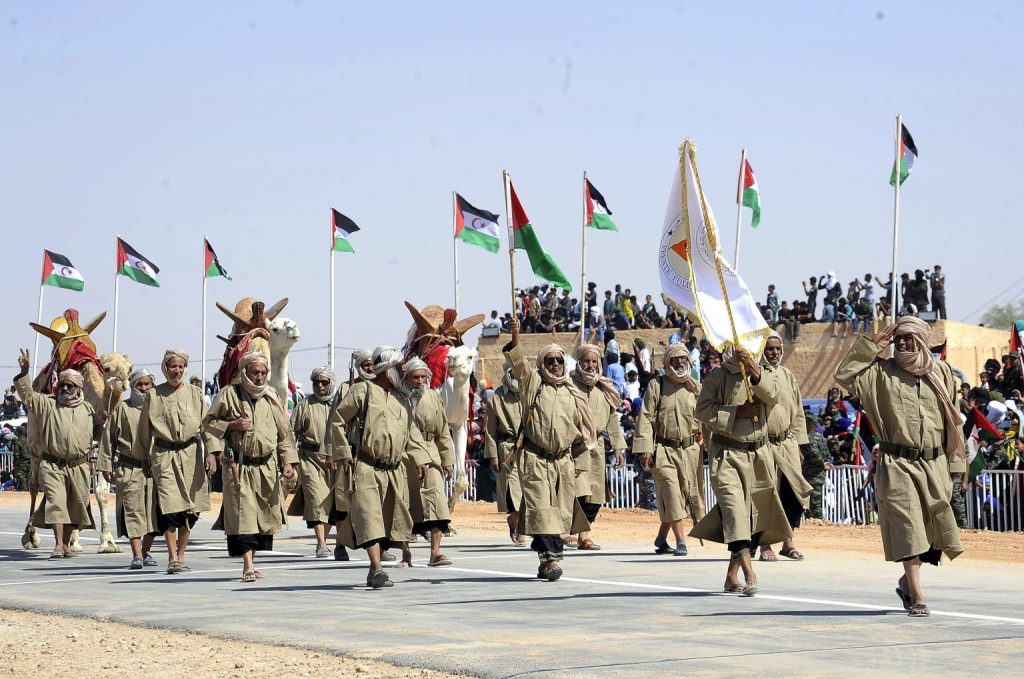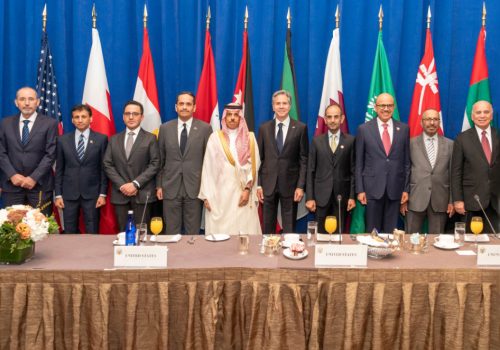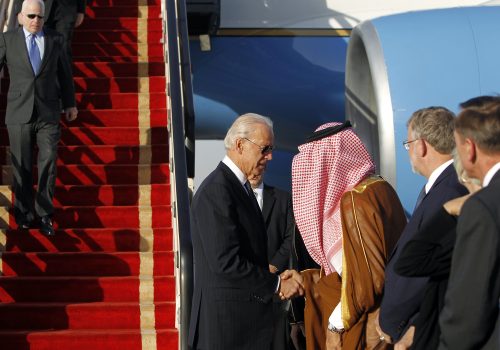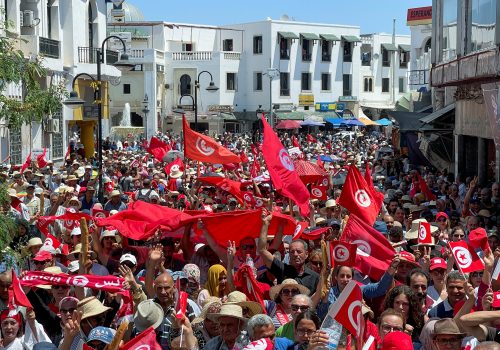The long-dormant conflict over the disputed territory of Western Sahara has experienced a resurgence in recent years, posing new challenges to regional stability. The 2020 collapse of a 1991 cease-fire brokered by the United Nations (UN); US recognition of Moroccan sovereignty over the territory that same year; and a series of diplomatic tit for tats have freshly inflamed relations between the main sides. The appointment of a UN envoy, Staffan de Mistura, in 2021 provided a glimmer of hope that cease-fire talks could resume. The UN and the United States are trying to revive UN-led negotiations to stabilize the conflict and contain regional tensions. This article focuses on the evolving dynamics of the conflict, the UN envoy’s role, and the United States’ renewed diplomatic push toward a return to the diplomatic process.
Back to war in Western Sahara
The conflict between Morocco and the Western Sahara’s pro-independence Polisario Front goes back to the end of Spanish colonial rule. It was ignited in 1975 after Spain relinquished control of Spanish Sahara, later known as Western Sahara. Morocco and Mauritania divided the territory between themselves, while the pro-independence Polisario Front, backed by Algeria, proclaimed a Sahrawi Arab Democratic Republic and launched a military struggle against what it viewed as two occupying powers. Mauritania withdrew from its part of the territory in 1979 after a series of military defeats at the hands of the Polisario, leaving it to Morocco. Over the following years, Rabat consolidated control over most of Western Sahara, building a defensive wall along the entire territory known as the “sand berm,” which de facto left 80 percent of the area in Moroccan hands and 20 percent under Polisario control.
The ensuing military stalemate laid the basis for a 1991 UN-mediated settlement plan, which established a cease-fire and a UN buffer zone along the sand berm; called for a self-determination referendum; and set up a mission, MINURSO, to monitor the cease-fire and organize the referendum. The vote never took place due to Moroccan objections. Subsequent negotiations failed to achieve a breakthrough, even though the two sides continued to abide by the cease-fire. In 2007, under pressure from France and the United States, Morocco proposed an autonomy plan that would provide for a degree of self-government for Western Sahara under its sovereignty. The Polisario rejected it out of hand for denying the Sahrawi population’s right to self-determination.
The conflict remained frozen until a series of events in 2019-2021 reignited hostilities, spreading tensions through the wider region. Starting in 2019, Rabat convinced a number of Arab and African governments to open consulates in Morocco-controlled Western Sahara, signaling their recognition of Rabat’s sovereignty over the territory. In November 2020, the 1991 cease-fire collapsed when Morocco seized a section of the UN buffer zone to clear a blockade of a key route by Polisario activists and in response the Front resumed its attacks against Morocco in Western Sahara. Tensions escalated further in December 2020 when the Donald Trump administration extended US recognition to Morocco’s control of Western Sahara, and again in August 2021, when Algeria broke off diplomatic relations with Morocco, partly over the latter’s unilateral moves in Western Sahara.
A low-intensity conflict
The intensity of the hostilities over Western Sahara during the conflict’s latest round has remained fairly limited, mainly due to a military imbalance in favor of Rabat. Since the end of the cease-fire in 2020, the Polisario has been able to do little more than fire at the Moroccan sand berm in a series of hit-and-run attacks. Yet the vast majority of its attacks are confined to a northeastern section of the former UN buffer zone inside Western Sahara, suggesting that the group is unable to carry out attacks in the rest of the territory. The Front largely demobilized after the 1991 cease-fire, maintaining only minimal forces; it then lost one of its main arms suppliers, Libya’s Muammar al-Qaddafi, in 2011, leaving it mostly dependent on outdated equipment. Morocco, from its side, can deploy technologically advanced weapons, including drones, which have granted it air superiority.
The most destabilizing incidents have come from alleged Moroccan attacks on Algerian and Mauritanian civilian convoys. These have threatened to widen the conflict to the rest of the region. In November 2021, an alleged Moroccan drone strike in Polisario-controlled Western Sahara resulted in the deaths of three Algerian truck drivers en route to Mauritania. The incident prompted the Algerian presidency to publicly pin the blame on Rabat and vow retaliation. A second such incident occurred in April 2022, when Algeria accused the Moroccan air force of killing another three people in an attack on a civilian truck convoy near the Mauritanian border.
More recently, an attack inside Moroccan-controlled Western Sahara has highlighted the potential for further military escalation. On May 20, an alleged bomb attack reportedly targeted a segment of a 100-kilometer conveyor belt used by Morocco to export phosphates from a mine located deep within Western Sahara to the coast. Moroccan and pro-Polisario media outlets refrained from reporting on this incident, but the pro-Polisario nongovernmental organization Western Sahara Resource Watch released a series of videos supporting the claim that the incident had happened. If the incident did in fact take place, it would mark the first such attack in Moroccan-controlled Western Sahara since the cease-fire’s collapse. While the fact that neither side publicized the alleged event suggests a shared interest in avoiding an escalation at this stage, this kind of attack hints at the possibility of a new, more dangerous phase in the conflict, should diplomacy fail to contain tensions.
The UN Security Council’s hesitations and de Mistura’s role
Divisions and inaction marked the UN Security Council’s initial response to the restart of the conflict in 2020. The council remained inactive for weeks after the cease-fire collapsed due to deep divisions within its ranks between pro-Polisario (such as Russia among the permanent members, as well as several African and Latin American countries) and pro-Morocco member states (such as France and many Arab and West African governments). Pro-Polisario members wanted the council to publicly put more pressure on Rabat, while pro-Morocco states supported the kingdom’s reluctance to allow any form of international scrutiny of the conflict.
All attempts to push the council to discuss and take a position failed. When Germany requested consultations on the matter in December 2020, Rabat suspended diplomatic ties in retaliation. In April 2021, the United States tried to push the council to take a stance on the need to avoid an escalation and appoint a new UN envoy, but this initiative crashed on a roadblock thrown up by India, which acted on Morocco’s behalf. This move was enough to block the US initiative, as Washington realized that the costs of overcoming New Delhi’s objection would far outweigh the initiative’s benefits.
Faced with a paralyzed Security Council, the Joe Biden administration tried to ease hostilities in Western Sahara. It pushed for the appointment of Staffan de Mistura as the new UN envoy, overcoming Rabat’s initial rejection. Yet, it refrained from clarifying its position on former President Trump’s decision to recognize Moroccan sovereignty over Western Sahara, in an apparent attempt to avoid antagonizing either side.
The Security Council’s divisions and widening gap between Morocco and the Polisario meant that de Mistura had to operate within a very tight policy space. Following the collapse of the cease-fire, the two sides presented diverging views regarding the format and substance of future negotiations. For Rabat, the only way to return to talks was to resume the 2019 roundtable format, which included Algeria, Mauritania, and the Polisario, and to discuss acceptance of its 2007 autonomy plan. The roundtable format was a short-lived negotiating arrangement introduced in 2019 by former UN envoy Horst Kohler, who resigned after only two negotiating sessions for personal reasons, leaving the position vacant until de Mistura’s appointment. The Moroccans view the Polisario as an Algerian proxy and contend that only a grand bargain with Algeria and Mauritania can end the conflict. From its side, the Polisario insists on direct bilateral talks with Morocco to set the terms for a self-determination referendum.
De Mistura embarked on rebuilding ties with regional actors through the use of constructive ambiguity. By prioritizing direct bilateral consultations and keeping a relatively low profile, he gradually expanded his scope of action. His use of the phrasing “all concerned” to avoid precisely describing who should be involved in future negotiations, and invitation to Morocco and the Polisario Front to move beyond their current positions, provided a basis for moving forward. In particular, the “all concerned” language allowed him to sidestep the issue of who should be involved in diplomatic efforts related to Western Sahara by addressing all the parties with a stake in this conflict, whether as direct parties or regional observers. Through such constructive ambiguity, he was able to avoid defining exactly which actors should be involved and which plan should be the basis for negotiations. In October 2022, the Security Council adopted amendments to its annual resolution on Western Sahara that echoed the envoy’s wording, thus providing him with much-needed backing and placing pressure on the parties to engage with him.
Washington’s role
The Biden administration has started playing a somewhat more assertive role in efforts to revive UN-brokered negotiations. Over the past months, US officials have engaged with all parties involved, aiming to contain regional tensions and rebuild the UN framework for Western Sahara. Washington’s unique position as the only external actor capable of engaging with all stakeholders makes it a critical interlocutor.
Other external actors have struggled to have any impact. France has strengthened its relations with Algeria over the past months, to the detriment of its traditionally close ties with Morocco. Two events in particular contributed to the deterioration. In January 2023, President Emmanuel Macron met with Algerian Chief of Staff Said Chengriha in Paris; and Morocco accused French members of the European Parliament of backing, if not championing, a resolutioncondemning Moroccan violations of press freedom. For its part, in 2022 Spain publicly endorsed the 2007 Moroccan autonomy plan as “the most serious, realistic and credible basis” to solve the conflict, angering the Polisario and Algeria. Germany also expressed its support for the Moroccan plan, having mended its ties with Rabat. And Morocco sees Russia, which is preoccupied with its war in Ukraine, as too close to Algeria’s and the Polisario’s stancesto be a credible mediator.
Despite its privileged position, Washington has been reluctant to invest significant political capital in ending the conflict, considering it a low-priority issue. Instead of applying pressure, the administration has tried to build confidence among all the main stakeholders by leveraging their desire for strong ties with the United States. To this end, the Biden administration has worked to establish closer economic and security ties with Algeria, maintained relations with Morocco, and offered the Polisario the prospect of an expanded diplomatic relationship. But its reluctance to make a bigger push for negotiations could hamper the UN envoy’s efforts.
Indeed, Morocco has yet to modify its position. Moroccan diplomats continue to engage with the UN envoy, but refuse to abandon the 2019 roundtable format or negotiate beyond their autonomy plan. The Polisario remains open to discussing the envoy’s proposals, but skeptical of the current circumstances for negotiations due to a lack of international attention toward the conflict and a weak negotiating position.
Israel’s recognition of Moroccan sovereignty over Western Sahara
Despite the temporary lull in tensions, Israel’s recognition of Moroccan sovereignty over Western Sahara has further exacerbated regional tensions. The Moroccan media celebrated the July 17 announcement as another diplomatic victory for the kingdom. The move did not go unchallenged. Three days later, the Algerian Ministry of Foreign Affairs condemned it as “a blatant violation of international law.”
Israel’s step may have bolstered Morocco’s efforts to formalize its control over the territory but is unlikely to inject real momentum in its strategy to secure international support for its claim. International media highlighted how the move strengthens the dominant narrative that Rabat has the upper hand in this conflict, but Israel’s controversial role in the region suggests that few other states will follow its example.
Supporting a fragile path back to negotiations
The Western Sahara conflict continues to present significant challenges to regional stability, but recent diplomatic efforts offer hope for progress. With some modest backing from the Security Council, de Mistura has managed to open some limited space to pursue a political solution. To ensure that the UN envoy’s efforts to revive talks have any chance of success, Washington should engage more proactively as a relatively impartial broker by extracting concessions from both sides to create a climate more conducive to resuming negotiations. As a first confidence-building step, the United States could ask Rabat to release at least some of the Sahrawi activists who have been detained since protests in Gdeim Izik in 2010 and grant the UN envoy unrestricted access to Moroccan-controlled Western Sahara. On the other side, it should encourage the Polisario to unilaterally suspend its military operations against Morocco. Such steps, if successful, could be enough to lay the basis for a resumption of negotiations.
Riccardo Fabiani is the project director of the North Africa program at the International Crisis Group
In partnership with

Related content
Image: Members of the Polisario Front hold a parade to commemorate the 50th anniversary of the outbreak of their armed struggle.



